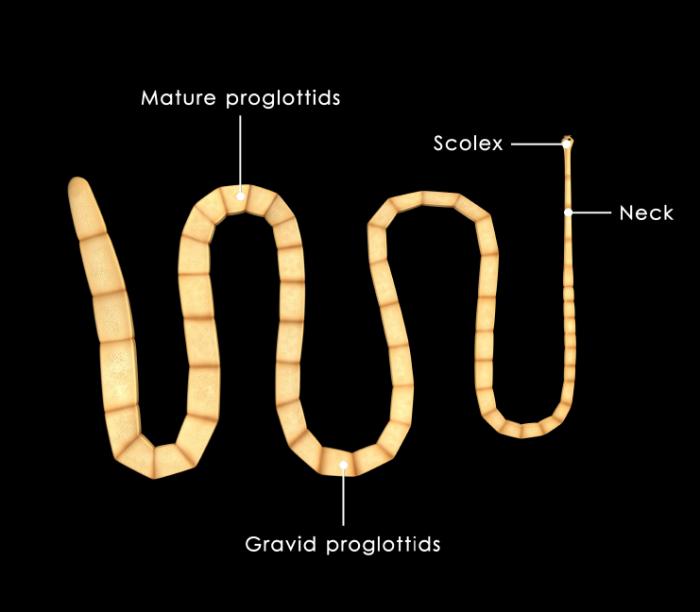Tapeworm

What is Tapeworm Infection?
Tapeworm infection, also known as taeniasis, is a parasitic infection caused by the ingestion of tapeworm larvae. These parasites can infect the intestines of humans and animals, leading to various health issues. Tapeworms have a long, flat body composed of segments, and they can grow to several meters in length. There are different species of tapeworms that can infect humans, including the pork tapeworm, beef tapeworm, and fish tapeworm.
Who's at risk for Tapeworm Infection?
Tapeworm infections are more prevalent in regions with poor sanitation and hygiene practices. People who consume undercooked or raw meat, particularly pork, beef, or fish, are at a higher risk of acquiring tapeworm infections. Additionally, individuals who come into contact with contaminated soil or consume food or water contaminated with tapeworm eggs can also become infected.
What causes Tapeworm Infection?
Tapeworm infection occurs when a person ingests tapeworm larvae or eggs. This can happen by consuming undercooked or raw meat that contains the larvae or eggs of tapeworms. In some cases, individuals can also acquire the infection by ingesting tapeworm eggs through contaminated food, water, or hands that have come into contact with tapeworm eggs.
How does Tapeworm Infection start?
Tapeworm infection begins when the tapeworm larvae or eggs enter the digestive system of a person. Once inside the intestines, the larvae develop into adult tapeworms. The tapeworms attach themselves to the intestinal wall using their hook-like mouthparts and start growing by absorbing nutrients from the host's digestive system. Over time, the tapeworm's body develops segments that contain eggs, which are then shed through the host's feces, completing the life cycle.
What are the symptoms of Tapeworm Infection?
In many cases, tapeworm infections may not cause noticeable symptoms. However, when symptoms do occur, they can include abdominal pain, nausea, weakness, weight loss, diarrhea, or constipation. In some rare cases, the presence of tapeworm larvae in other organs, such as the liver or brain, can lead to more severe symptoms and complications.
How is Tapeworm Infection diagnosed?
The diagnosis of tapeworm infection is typically made through a combination of clinical evaluation, medical history, and laboratory tests. A healthcare professional may inquire about the patient's symptoms, travel history, and dietary habits. Stool samples may be collected and examined under a microscope to detect the presence of tapeworm eggs or segments. In some cases, imaging tests such as ultrasound or MRI may be used to identify any potential complications or larval migration.
How can Tapeworm Infection be treated?
The treatment of tapeworm infection involves the use of antiparasitic medications, such as praziquantel or albendazole. These medications work by killing the tapeworm and allowing it to pass out of the body. The specific medication and duration of treatment may vary depending on the type of tapeworm infection and the severity of the symptoms. It's important to follow the prescribed treatment regimen and to inform the healthcare provider if any side effects occur.
What complications may occur with Tapeworm Infection?
If left untreated, tapeworm infection can lead to various complications. For instance, certain types of tapeworms can migrate to other organs, such as the liver, lungs, or brain, causing serious conditions like cysticercosis or neurocysticercosis. In rare cases, tapeworm infections can result in intestinal blockages or malabsorption of nutrients. Additionally, if a person accidentally ingests tapeworm eggs, it can cause a condition called cysticercosis, where the larvae form cysts in various tissues.
How can I prevent Tapeworm Infection?
To prevent tapeworm infection, it is important to follow good hygiene and food safety practices. This includes thoroughly cooking meat to a safe temperature, washing hands before handling food, and maintaining proper sanitation in food preparation areas. It is also advisable to avoid consuming raw or undercooked meat, particularly from unreliable sources. Additionally, practicing good personal hygiene, such as washing hands regularly, can reduce the risk of tapeworm infection.
Long-term management of Tapeworm Infection
After successful treatment of tapeworm infection, long-term management focuses on prevention and monitoring for any potential re-infection or complications. This involves maintaining good hygiene practices, such as washing hands before meals and after using the restroom. It may also be necessary to have follow-up appointments with a healthcare professional to ensure complete eradication of the infection and to address any lingering symptoms or concerns.
What is recent research saying about Tapeworm Infection?
Recent research on tapeworm infections has focused on improving diagnostic methods and developing more effective treatments. Scientists are investigating new techniques, such as molecular testing, to detect tapeworm infections with higher accuracy and efficiency. Additionally, researchers are exploring alternative drug options and potential vaccines to combat tapeworm infections. The aim is to develop safer and more accessible treatments to reduce the burden of tapeworm infections globally.
Where can I go for more information on Tapeworm Infection?
For more information on tapeworm infections, it is recommended to consult reputable sources such as the Centers for Disease Control and Prevention (CDC), the World Health Organization (WHO), or the National Institutes of Health (NIH). These organizations provide up-to-date and reliable information on tapeworm infections, including prevention strategies, treatment guidelines, and ongoing research. Local healthcare providers and public health departments can also serve as valuable resources for specific regional information and guidance.

